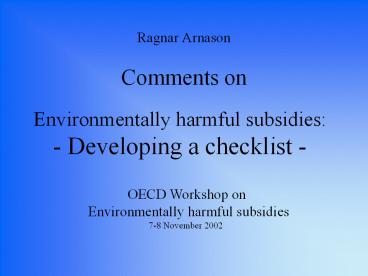Ragnar%20Arnason%20Comments%20on - PowerPoint PPT Presentation
Title:
Ragnar%20Arnason%20Comments%20on
Description:
... some guidelines a checklist perhaps. ... what a good checklist is supposed to do ... Flow chart behind the checklist. Subsidy removal likely to be ... – PowerPoint PPT presentation
Number of Views:35
Avg rating:3.0/5.0
Title: Ragnar%20Arnason%20Comments%20on
1
Ragnar ArnasonComments on
- Environmentally harmful subsidies
- - Developing a checklist -
OECD Workshop on Environmentally harmful
subsidies 7-8 November 2002
2
Basic considerations
- There is a good (but not an unqualified) economic
case for removing (or reducing) subsidies - There is an even better economic case for
removing economically harmful subsidies - (if by harmful we mean deviation from
the optimal harm)
3
..but
- Not all subsidies are equally harmful
- There are lot of counterexamples
- (i.e. where subsidy is economically beneficial
and its removal a mistake)
4
q
5
Therefore we need more information
- Basically, an empirical economic/environmental
general equilibrium model - But, this is not available (and not in sight)
- And environmental concerns are pressing
- Therefore we need some guidelines a checklist
perhaps. - But with almost no theory and little data this is
very difficult!
6
An illustration
- Following Jan Pieters, assume
- Government wants to reduce environmentally
harmful subsidies by a given amount - Which subsidies should it reduce and by how much?
7
Two environmental goods y and x
Budget constraint
8
But this is too simplistic
- Environmental goods cannot really be generated
(or bought) at a constant rate. - Subsidy reduction (may) produce environmental
goods - That production is the output of the economic and
environmental GE-system - If that production is well behaved (..not
particularly likely), it will look like
9
Production of environmental goods
Production possibility frontier
10
A possible case
11
Another possible case
12
Yet another possible case
y
x
13
Back to the checklist
- A checklist is supposed to reflect this
- Not the optimal solution
- But the ranking of of alternatives for allocating
subsidy reductions. - So, we can
- Do things in the right order
- Avoid drastic mistakes
Note The ranking depends on the situation! It
cannot be invariant (over space, time, extent of
subsidies, output, cultures etc)!
14
Therefore, to compile the checklist, we need to
know
- The transformation frontier
- The social preference (utility) map
- In a dynamic context
15
The transformation frontier(How do subsidy
reductions translate into environmental benefits)
- For all environmental variables!
- Requires intricate economic knowledge (dynamic GE
model) - Requires intricate environmental knowledge (how
does economic activity really affect the
environment)
We dont have this knowledge!
16
The social utility map
- Basically environmental valuation
- This is a function of environmental quality
- This is a function of the state of the economy
(all economic variables)
We dont have this knowledge!
17
We are like a man sent to the supermarket to buy
groceries
- He has a certain amount to spend
- But doesnt know the price of the goods
- (I.e. how much he gets for a given expenditure)
- He doesnt know the utility generated by the
goods.
What can he do?
18
The problem is one of choice under uncertainty
- Only if all outcomes are equally likely will it
be optimal to do nothing. - Assuming constant risk over choices, the best
choice is to pick the most likely options. - This is precisely what a good checklist is
supposed to do - It increases the likelihood of a good choice
19
Jan Pieters checklist
- Not solidly founded in theory
- But impressively intuitive (and practical)
- Misses two important aspects
- Corresponding to every subsidy is a tax
- The environmental gains must be valued
- Apart from this I found myself in general
agreement
20
Flow chart behind the checklist
21
End































